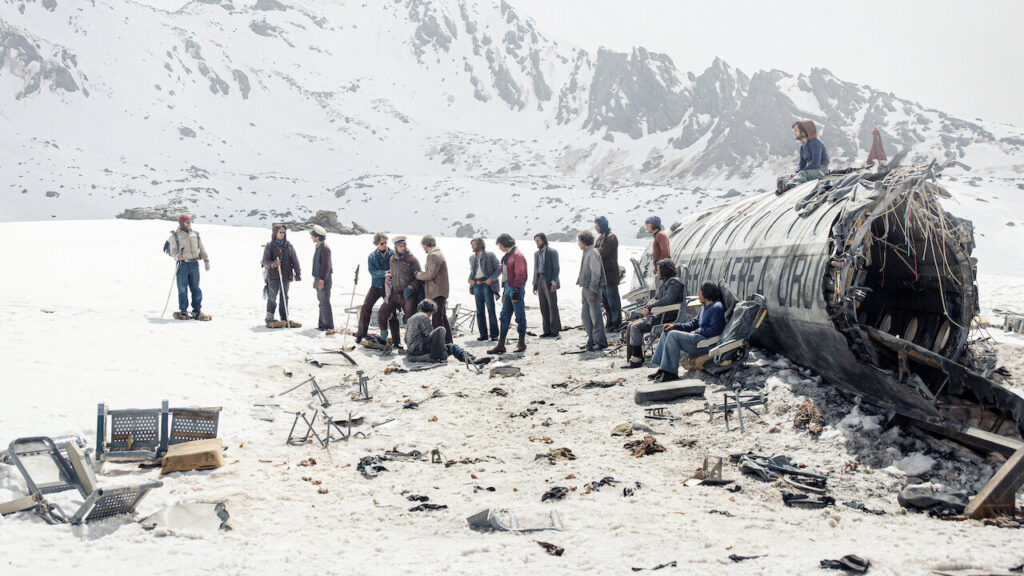If there is one thing you can say about Spanish filmmaker J. A. Bayona, it’s that he knows how to capture tragedy in a most beautiful, authentic way. Bayona’s latest, Society of the Snow, treads a similar path to his previous work, like The Impossible, as a disaster movie tackling real-world events, while also harnessing the kind of emotional agony of his coming-of-age drama, A Monster Calls. While Society of the Snow ultimately has a relatively happy ending, it is not without sacrifice, and this is one of those rare films that you simply have to see, but will likely never want to watch ever again once you come out the other side.
Society of the Snow is based on the true story of Flight 571, also known as the Andes flight disaster, which occurred on October 13, 1972. When a Uruguayan rugby team’s plane crashes in the Andes mountains, the survivors face extreme conditions, including freezing temperatures and high altitudes, and are forced to resort to cannibalism to survive after running out of food. The harrowing ordeal lasted for 72 days until rescue teams eventually reached the survivors. Out of the 45 people on board, only 16 survived. The story gained international attention due to the extreme measures taken for survival and the ethical dilemmas faced by the survivors throughout the tragedy.

If this all sounds familiar, that’s because Frank Marshall made an English-language version of the story back in 1993, starring none other than Ethan Hawke. Bayona’s new movie adopts his native Spanish language and feels all the more genuine for it. Indeed, Society of the Snow is effectively shot through a documentarian lens, with intimate access to the victims in their darkest, most desperate moments, offering an unflinching insight into the tragedy that feels startlingly realistic. But it’s not just the raw, invasive cinematography that imbues this picture with a sense of legitimacy.
The ensemble cast has no real lead—rightfully so in a story of this nature—but every single actor on screen sells the gritty realism of the film, from poignant and powerful speeches on matters of life, death, faith, and the future, right down to the increasing agony behind their eyes. Numa Turcatti (played by Enzo Vogrincic) arguably has the most screentime, and it is his reluctance to resort to cannibalism and his acceptance of the fate awaiting him that draws the most attention and elicits the most gut-wrenching reactions. But, special mention should go to Fernando Contingiani, too, who plays Arturo Nogueira, who delivers a monologue so profound and incisive it will leave your hair standing on end.
On a technical level, Society of the Snow excels in all areas. I have already made a mention of the cinematography here, but it bears repeating. The framing and juxtaposition of man, machine, and the mountains is terrifying, both in its more claustrophobic moments and in showcasing the immense scale and vastness of the vicious terrain the victims find themselves. The use of color, or lack thereof, is masterfully employed throughout: bright, burning oranges, browns, and yellows embellish the rare moments of hope and vitality in the film, but the rustic, lively palette is drained and replaced by cold monochrome and grunge for the harsh realities of the confinement of the plane wreckage and the endless snow. Sound, too, is a powerful tool in any disaster movie, and Society of the Snow is not afraid to overwhelm the viewer with a cacophony of audible terror, from the screech of metal to the unforgiving elements, down to the crunching of bone and chewing of flesh. And, similar to the decisions made with color, Bayona and his team opt to mute all audio, and let silence do the talking to portray how alone and hopeless the survivors are at times.

Speaking of flesh, it’s worth warning viewers that, at times, Society of the Snow is akin to a body horror movie with its brutal depictions of blood, bones, and unthinkable injury detail. Credit should go to the makeup team for helping to create such visceral imagery in this respect, something which Bayona himself has been keen to recognize through his social media posts. As the film progresses, and the survivors become more gaunt and malnourished, you’d be forgiven for thinking you were watching a George A. Romero flick rather than a hyperrealistic biopic, such is the convincing nature of the practical effects. Bayona also took the time to celebrate the work of his visual effects team, and deservedly so, as they produce a formidable environment which—when combined with the audio-visual techniques—leaves the viewer under no illusions as to how harrowing this ordeal is for the young men and women on screen. It is no exaggeration to say that you can even feel the cold yourself, and Society of the Snow is a torment on the senses from every angle, but a rich experience for it all the same.
There are moments of hope to cut through the bleak, despairing journey, though. At its core, Society of the Snow is a story of brotherhood and the collaborative power of the human spirit. As upsetting and distressing as this film is, it is these brighter moments that shine through the strongest and, hopefully, are the predominant takeaways for anyone watching. From instances of selfless sacrifice and unrelenting moral support to the bravery of those venturing into the unknown in search of help and the eventual rescue of the 16 survivors, witnessing this enduring will to survive is incredibly moving. Still, there is a fine line between life and death, and nothing encapsulates this more effectively than a grisly little jumpcut early on in the film, which is so potent I couldn’t help but let out an audible gasp.
Ultimately, Society of the Snow is a film that is unshrinking in its portrayal of such a profound tragedy, but one which also attempts to find light in the darkest of places. This is undoubtedly Bayona’s strongest work to date, and by far his most authentic, too. Bayona refuses to look away, refuses to dilute the pain those 45 people went through, and their legacy is given all the respect and care it deserves in this poetic study of how precious life truly is.



